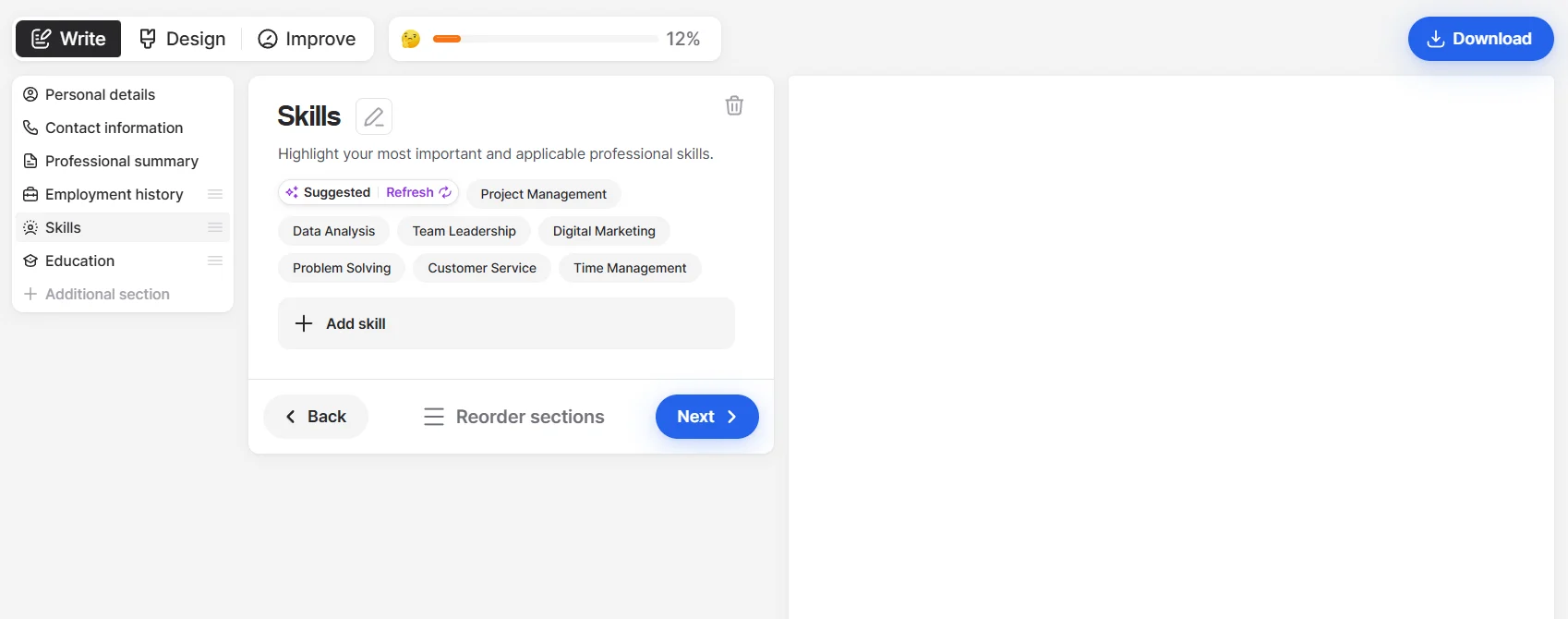The job market is evolving faster than ever, and the most in-demand hard skills today are shaped by AI, data, and digital transformation. Furthermore, employers prioritize candidates who can demonstrate technical expertise in programming, data science, cloud computing, and cybersecurity. These skills don’t just increase your chances of landing a job—they also boost your salary potential, career stability, and growth opportunities.
In this article, we’ll take an in-depth look at hard skills and what makes them important for long-term career success. We’ll also look at the most in-demand skills for the future to help you get ahead of the curve.
What Hard Skills Are and Why They Matter for the Future?
Hard skills are technical abilities necessary to perform core work operations. They are typically obtained through traditional learning methods, like formal education, relevant courses, certifications, and hands-on experience. Additionally, hard skills are easy to test and quantify. They can be assessed via tests, questionnaires, results, and more.
Unlike soft skills (e.g., teamwork or adaptability), which relate to personality traits and are transferable between professions, hard skills are tied directly to the role that you’re performing. They have a direct impact on your employability, workplace productivity, salary potential, and the possibility of career advancement.
How Hard Skills Drive Employability and Earnings
Hard skills directly influence employability and earnings, especially if a skill is in demand and difficult to acquire.
For example, data scientists’ median pay is $112,590, and they have a 34% job outlook, which is much faster than average. Similarly, computer and information research scientists’ median pay is $140,910 with a 20% job outlook.
The ability to perform highly specific tasks is becoming a key differentiator for job candidates today. Not only do these professionals get hired faster, but they are also more likely to get promotions or to keep their positions in cases of restructuring or layoffs.
Which Macro Trends (AI, Data, Digital Transformation) Fuel the Demand

Macro trends dictate demand for all skills, but they impact hard skills much more than soft skills.
Here are the three biggest macro trends that govern which technical skills employers want in 2026:
3 Biggest Macro Trends In 2026
AI and machine learning. The widespread adoption of artificial intelligence created a demand for professionals adept at programming languages, model development, prompt engineering, and ethical considerations of AI.
Data explosion. Businesses are working with increasing volumes of data, resulting in a significant increase in demand for professionals with data analysis and analytical skills. These experts need to manipulate vast quantities of information to help make valuable decisions.
Digital transformation. The shift toward digital operations requires professionals adept at cloud migration, cybersecurity, and low-code solutions that can expedite development and launches.
Core Data and AI Skills Driving Tomorrow’s Jobs
Let’s take a look at hard skills and job positions related to artificial intelligence, machine learning, and data science.
Artificial Intelligence and Machine Learning – Roles, Tools, Salary Outlook
Since today’s business market is focused on rapid technological advancements, artificial intelligence and machine learning skills are becoming core computer skills for resumes.
Here are some of the most common roles in these fields:
Most Common Roles
Machine learning engineer: Develops machine learning and deep learning systems. Notable tools used include TensorFlow and PyTorch.
Prompt engineer: Designs and refines inputs for artificial intelligence to get optimal outputs. Their work requires proficiency in the OpenAI API and similar tools.
AI ethics specialist: Controls AI development and ensures it’s utilized responsibly. They leverage various audit tools and focus on AI fairness and bias.
AI specialists and prompt engineers have salaries that range from $95,000 to more than $270,000. Moreover, this is an emerging field where the demand for professionals is projected to increase.
Data Analysis and Data Science – Key Platforms, Industry Use Cases
Modern businesses often have to work with large quantities of information, so it’s no surprise that data analysts and data scientists are in high demand.
These professionals often use programming languages and tools like Python, SQL, R, Tableau, and Power BI to clean up data, uncover hidden trends, build predictive models, and drive strategic decision-making.
For instance, they can develop risk models to help financial organizations avoid losses or create optimization models for supply chains, reducing their operational costs.
Digital Infrastructure Skills: Cybersecurity and Cloud
Expansion of a digital infrastructure resulted in a growing need for professionals with proficiency in cybersecurity and cloud computing skills.
Cybersecurity – Threat Landscape and High‑Growth Opportunities
Cybersecurity specialists protect digital infrastructure from various threat vectors, everything from ransomware to sophisticated supply chain attacks. Specific roles, like security analyst, cloud security engineer, and incident responder, are tasked with protecting the infrastructure and its data.
Some of the core cybersecurity skills employers need today include network security, risk management, security auditing, penetration testing, digital forensics, and intrusion detection.
If you’re at the beginning of your career, you will likely begin as a security analyst. From there, there are multiple positions branching out, depending on your interests and experience. Ultimately, you can aim for a senior role such as chief information security officer (CISO).
Cloud Computing – Major Providers, Certifications, Career Paths
Cloud computing revolutionized the way digital businesses operate by offering cost-effective scalability and flexibility. The three leading cloud providers are Amazon Web Services (AWS), Microsoft Azure, and Google Cloud. They also offer numerous certifications that you can obtain to improve your hard skills and career prospects.
Obtaining one of these certifications is a typical way to start a career in cloud computing. You’ll get a knowledge foundation and some of the most in-demand hard skills for a resume. From there, a typical career path involves landing a junior role, like a cloud administrator. The next step would be a cloud engineer or architect, with a cloud DevOps lead being a senior position.
Development, Design, and Marketing Hard Skills
While software development, digital design, and marketing are more traditional fields than artificial intelligence and cloud computing, there is a growing need for professionals who have those skills.
Software Development and Programming – Top Languages and Project Ideas
The need for adept software developers and programmers stays strong, even with the use of AI for coding assistance. Some of the best programming skills for resumes include proficiency in languages like Python, JavaScript, Java, Go, and Rust.
Python is typically used in machine learning, JavaScript is the go-to language for web development, Java is used by large enterprises, Go is renowned for its efficiency when it comes to scalable network services, and Rust is utilized for performance and security.
Showcasing these hard skills on your resume will help you get noticed, but you can get further ahead by building a strong portfolio. For instance, you can maintain a GitHub repository with projects and links or even build a personal website.
UX/UI Design – Design Thinking and Portfolio Tips
UI/UX designers make digital products, platforms, and solutions accessible and user-friendly. These are the perfect hard skills for creative IT professionals without a background in engineering or coding.
In addition to a well-written resume, a strong portfolio is a must to help you get the job. When adding projects to it, make sure to follow a case study template that presents a problem, describes your process of resolving it, and finally demonstrates an outcome.
Digital Marketing and SEO – Data‑Driven Campaigns and Essential Tools
Technological advancements resulted in digital marketing shifting toward a performance-based approach. Companies are leveraging data and analytics to track key metrics like Click-Through Rate (CTR), Customer Acquisition Cost (CTA), Return on Ad Spend (ROAS), and evaluate the performance of their campaigns.
Some of the most sought-after digital marketing skills for resumes today include proficiency in digital tools, like Google Analytics, SEMrush, and HubSpot. Additional hard skills for digital marketers include Search Engine Optimization (SEO), social media marketing, content creation, email marketing, etc.
Strategic and Emerging Skills for a Future‑Ready Career

The job market continuously evolves, following technological advancements. This results in some existing strategic skills becoming more prominent, and additional abilities emerging. Let’s see what they are.
Project Management and Agile – Frameworks, Certifications
Project management skills and proficiency in Agile frameworks allow professionals to handle increasingly complex ventures in fast-paced environments. Agile methodologies, like Kanban and Scrum, have become staples in many organizations due to their efficiency and flexibility.
In addition to showcasing these skills in your resume, you also want to include any certifications that you may have. This can include Project Management Professional (PMP), PMI-Agile Certified Practitioner (PMI-ACP), Certified Scrum Master (CSM), and other certifications.
Blockchain and Decentralized Technologies – Applications and Job Market
Blockchain and decentralized technologies aim to disrupt the traditional, centralized approach that most industries have. With its core concepts, like cryptocurrencies, smart contracts, and distributed ledgers, blockchain aims to transform everything from supply-chain traceability to financial centralization.
Professionals looking to enter or advance in these fields will need a strong foundation in DeFi (decentralized finance) skills. This includes knowledge of programming languages like Solidity and Rust for smart contract development, understanding of cryptocurrencies, knowledge of risk management, and more.
Prompt Engineering and AI Risk Management – Why They Matter Now
The explosion in popularity of large language models (LLMs) and AI image/video generators resulted in the appearance of a new hard skill: prompt engineering. Expert prompt engineers know how to craft precise and detailed inputs to gain desired outputs from AI models.
On the other hand, as AI becomes more powerful and integrated into everyday lives and business processes, the need for professionals who can manage associated risks increases. These risks encompass everything from bias and a lack of transparency to privacy risks, potential misinformation, and regulatory challenges.
How to Acquire and Showcase High‑Demand Hard Skills
Now that you know what skills are the most in demand, let’s see how you can obtain them.
Learning Resources, Certification Pathways, and Typical Time‑to‑Proficiency
There are plenty of online resources you can utilize to acquire new hard skills. Platforms like Coursera and edX offer various courses from the biggest companies and top universities in the world.
For instance, you can obtain a Google Data Analytics Professional Certificate on Coursera, which takes 3–6 months on average. Similarly, you can complete AWS Certified Cloud Practitioner Essentials on edX in 1–2 months of dedicated work.
Building a T‑Shaped Skill Profile – Combining Depth & Breadth
A T-shaped skill profile refers to having a deep expertise in 2–3 core skills while being broadly familiar in adjacent spheres. This combination of depth and breadth gives you sufficient versatility to thrive in ever-evolving positions.
A good example of a T-shaped skill profile would include a deep understanding of artificial intelligence and machine learning, with broader knowledge of cloud computing and project management.
Resume.co Tip: Optimizing Your Resume and LinkedIn for Each Skill

Resume.co’s software solution can help you choose the best hard skills to list on your resume and in your LinkedIn profile.
Our resume builder will analyze your inputs (e.g., your job title and work history) to give you tailored, ATS-compatible suggestions of skills that are most sought-after in your field. You can add these skills to your resume and LinkedIn profile to optimize them for human readers and applicant tracking software.
Final Thoughts
The most in-demand hard skills are influenced by the continuously evolving digital landscape. As AI progresses at a rapid pace, employers are looking for professionals who can position themselves as leaders and innovators in this sphere.
As far as high-demand skills for the next 10 years go, your best bet is to go into fields like artificial intelligence, machine learning, digital marketing, and project management. Don’t forget to create a T-shaped skill profile to gain valuable versatility and get ahead of the competition.
Most In-Demand Hard Skills FAQ
#1. What salary range can I expect for each of the top 10 hard skills in 2026?
The salary range you can expect from the top 10 hard skills in 2026 depends on the position you’re after. For instance, AI prompt engineers are earning between $175,000 and $300,000 per year, while cybersecurity specialists are earning $90,000–$130,000.
#2. How do I decide which high‑demand skill aligns with my current experience and career goals?
To decide which high-demand skill aligns with your current experience and career goals, conduct a skill gap analysis, consider industry demands, and prioritize abilities that align with and complement your existing skill set.
#3. How long does it typically take to become job‑ready in each skill?
How long it takes to become job-ready in a skill depends on the skill. For example, you can obtain an entry-level cloud certification in 3–6 months or become a junior full-stack developer in 9–15 months. The time it takes also depends on your prior knowledge and related skills.
#4. How can I combine multiple hard skills to create a T‑shaped profile?
To create a T-shaped profile with hard skills, you want to become an expert in two core fields, and then supplement that with broader knowledge in adjacent areas. For instance, you can learn AI and cloud computing in-depth, and additionally learn data visualization and project management hard skills.
#5. What emerging skills should I start learning now to stay ahead beyond 2026?
Some of the emerging skills you should start learning in 2026 and beyond include prompt engineering, AI risk management, the basics of quantum computing, and low-code/no-code platforms. These are some of the most in-demand skills for the future that can help you get ahead of the competition.
#6. How can I measure my proficiency level in each hard skill?
There are several ways to measure your proficiency level in a hard skill. A formal way is to use standardized certification exams. Another method is online skill assessments, like LinkedIn Skill Assessments. You can also compare the outcomes of your projects against industry-standard KPIs.
#7. How do I effectively showcase project experience for these hard skills on my resume?
To showcase your hard skills through project experience, you want to connect your skills with relevant accomplishments. Use bullet points when listing your accomplishments in the work experience section, and mention specific skills before highlighting the results you obtained.
Related Articles
9 High-Income Skills You Can Learn to Get into Lucrative Fields


